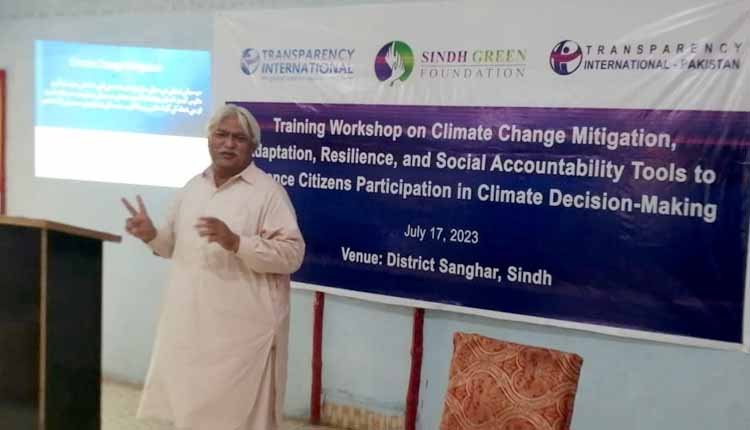Transparency International Pakistan Organized Training Workshop on Climate Change Mitigation, Adaptation, Resilience, and Social Accountability Tools in Sanghar
Sanghar, Sindh: Transparency International Pakistan in collaboration with Sindh Green Foundation (SGF) organized a Training Workshop on Climate Change Mitigation, Adaptation, Resilience, and Social Accountability Tools to Enhance Citizens Participation in Climate Decision-Making in District Sanghar, Sindh.
Participants representing civil society organizations, relevant line departments, academic and members of local communities participated in the workshop.
During Floods in 2022, Sanghar district was severely affected therefore it was crucial to enhance capacity building of local communities to adapt with climate disasters.
During the workshop Mr. Kashif Ali Shaikh, A. Executive Director, Transparency International Pakistan (TI-P) highlighted the importance of work on climate justice with engagement of civil society mainly youth and women, underrepresented and vulnerable segments facing social inequalities due to climate cries. He argued that corruption remains the most potent risk in climate finance and lack of transparency and accountability means that the benefits of climate action are not distributed equitably.
Mr. Nawaz Kunbhar, environmental expert shared his valuable insights on climate mitigation, adaption & resilience and adaptable living. He urged that communities need to practice efficient use of resources and conserver energy and water, while governments need to build climate smart infrastructure and implement long term policies to prevent climate disasters and minimize its destruction.
Mr. Sabir Hussain Mahar, focal person Disaster management, district govt Sanghar spoke on climate disasters risk and shared life practices to mitigate and risk reduction. He led an interactive session and presented case scenarios for participants.
Toufique Wassan, Project Coordinator, TI Pakistan discussed social accountability tools for preventing environmental crimes and citizen participation in decision making. He said that climate action needs transparency and participation of local communities to be effective.
Fariha Fatima, Assistant Project Coordinator, TI Pakistan, discussed the climate impacts on Sindh and vulnerability of women to climate change and risks during climate disasters.
Participants were engaged in group activities as well. They were given case scenarios and were asked to develop risk reduction strategies for government bodies and local communities.


Comments are closed, but trackbacks and pingbacks are open.